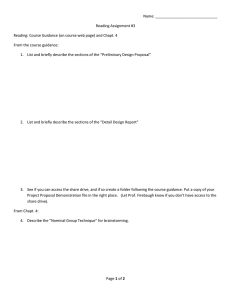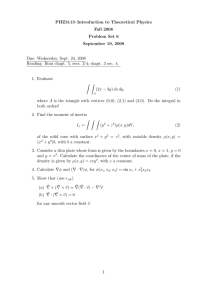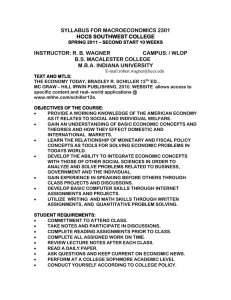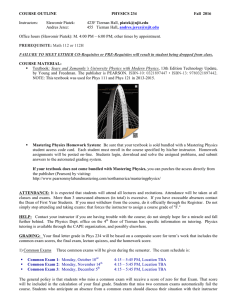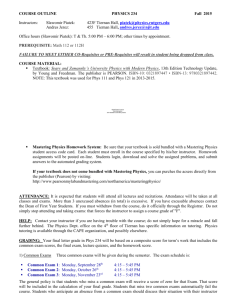COURSE OUTLINE PHYSICS 102 Spring 2014 Instructor: Slawomir
advertisement
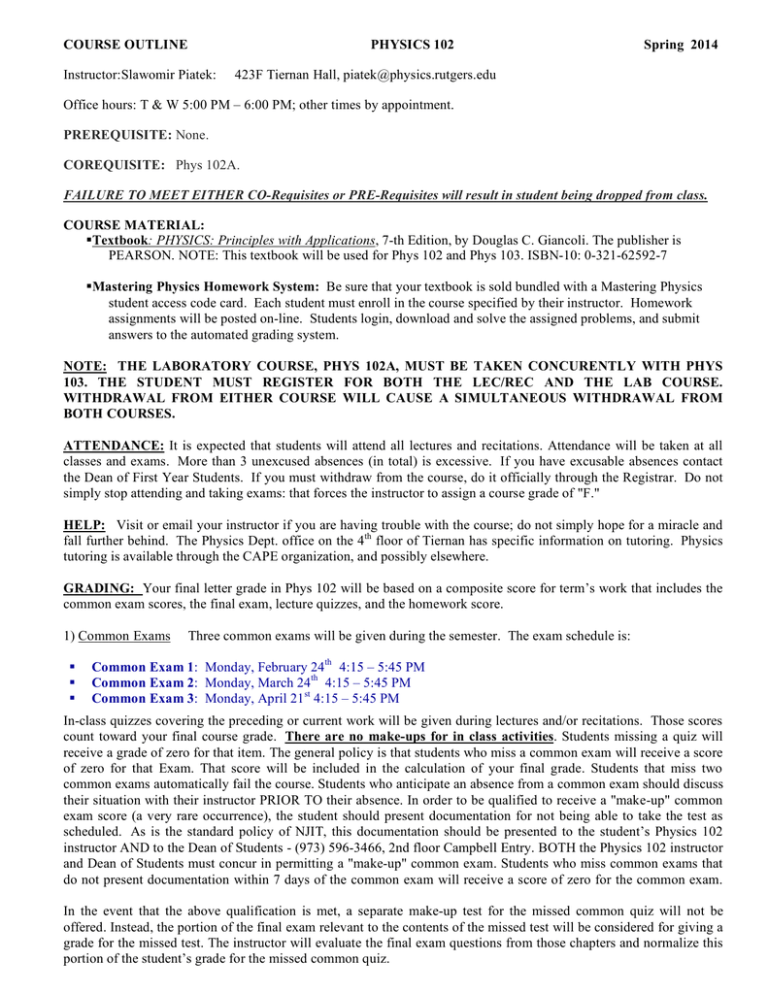
COURSE OUTLINE PHYSICS 102 Instructor: Slawomir Piatek: Spring 2014 423F Tiernan Hall, piatek@physics.rutgers.edu Office hours: T & W 5:00 PM – 6:00 PM; other times by appointment. PREREQUISITE: None. COREQUISITE: Phys 102A. FAILURE TO MEET EITHER CO-Requisites or PRE-Requisites will result in student being dropped from class. COURSE MATERIAL: Textbook: PHYSICS: Principles with Applications, 7-th Edition, by Douglas C. Giancoli. The publisher is PEARSON. NOTE: This textbook will be used for Phys 102 and Phys 103. ISBN-10: 0-321-62592-7 Mastering Physics Homework System: Be sure that your textbook is sold bundled with a Mastering Physics student access code card. Each student must enroll in the course specified by their instructor. Homework assignments will be posted on-line. Students login, download and solve the assigned problems, and submit answers to the automated grading system. NOTE: THE LABORATORY COURSE, PHYS 102A, MUST BE TAKEN CONCURENTLY WITH PHYS 103. THE STUDENT MUST REGISTER FOR BOTH THE LEC/REC AND THE LAB COURSE. WITHDRAWAL FROM EITHER COURSE WILL CAUSE A SIMULTANEOUS WITHDRAWAL FROM BOTH COURSES. ATTENDANCE: It is expected that students will attend all lectures and recitations. Attendance will be taken at all classes and exams. More than 3 unexcused absences (in total) is excessive. If you have excusable absences contact the Dean of First Year Students. If you must withdraw from the course, do it officially through the Registrar. Do not simply stop attending and taking exams: that forces the instructor to assign a course grade of "F." HELP: Visit or email your instructor if you are having trouble with the course; do not simply hope for a miracle and fall further behind. The Physics Dept. office on the 4th floor of Tiernan has specific information on tutoring. Physics tutoring is available through the CAPE organization, and possibly elsewhere. GRADING: Your final letter grade in Phys 102 will be based on a composite score for term’s work that includes the common exam scores, the final exam, lecture quizzes, and the homework score. 1) Common Exams Three common exams will be given during the semester. The exam schedule is: Common Exam 1: Monday, February 24th 4:15 – 5:45 PM Common Exam 2: Monday, March 24th 4:15 – 5:45 PM Common Exam 3: Monday, April 21st 4:15 – 5:45 PM In-class quizzes covering the preceding or current work will be given during lectures and/or recitations. Those scores count toward your final course grade. There are no make-ups for in class activities. Students missing a quiz will receive a grade of zero for that item. The general policy is that students who miss a common exam will receive a score of zero for that Exam. That score will be included in the calculation of your final grade. Students that miss two common exams automatically fail the course. Students who anticipate an absence from a common exam should discuss their situation with their instructor PRIOR TO their absence. In order to be qualified to receive a "make-up" common exam score (a very rare occurrence), the student should present documentation for not being able to take the test as scheduled. As is the standard policy of NJIT, this documentation should be presented to the student’s Physics 102 instructor AND to the Dean of Students - (973) 596-3466, 2nd floor Campbell Entry. BOTH the Physics 102 instructor and Dean of Students must concur in permitting a "make-up" common exam. Students who miss common exams that do not present documentation within 7 days of the common exam will receive a score of zero for the common exam. In the event that the above qualification is met, a separate make-up test for the missed common quiz will not be offered. Instead, the portion of the final exam relevant to the contents of the missed test will be considered for giving a grade for the missed test. The instructor will evaluate the final exam questions from those chapters and normalize this portion of the student’s grade for the missed common quiz. 2) Lecture Quizzes A short quiz (five questions) will be given during each lecture period. 3) Homework Homework assignments will be posted on-line using the Mastering Physics Homework System. Your instructor will announce the ID number for your course section. For Dr Piatek’s section, please register for “MPPIATEK1022014”. You will need it when you set up your login on the Mastering Physics web site and enroll in your section of the course. Please register for the correct section. login: www.masteringphysics.com. Homework due dates will be announced. The recommended problems from the text (see syllabus) will be discussed during the recitation class. 4) Final Exam FMH110. Comprehensive Final Exam will be given on Friday, May 9, 6:00 PM – 8:30 PM in Final Letter Grades : Here are the approximate weights to be used for calculating the composite score: 51% for all three common exams (17% each) 29% for the final exam 12% for the total of homework work 8% for all in-class quizzes The cutoff percentages for various letter grades will be in the range of 85% for A, 80 % for B+, 70% for B, 65% for C+, 50% for C, 40% for D, and F below 40 %. Final grades are not negotiable: A score of 84.999999% is a B+, not an A. HONOR CODE STATEMENT: NJIT has a zero-tolerance policy for cheating of any kind and for student behavior that disrupts learning by others. Violations will be reported to the Dean of Students. The penalties range from a minimum of failure in the course plus disciplinary probation up to expulsion from NJIT. Avoid situations where your own behavior could be misinterpreted as dishonorable. Students are required to agree to the NJIT Honor Code on each exam, assignment, quiz, etc. for the course. Turn off all cellular phones, wireless devices, computers, and messaging devices of all kinds during classes and exams. Please do not eat, drink, or create noise in class that interferes with the work of other students or instructors. Creating noise or otherwise interfering with the work of the class will not be tolerated. Learning Outcomes: For this course, you can expect to be assessed on the following learning outcomes: • Recall the definitions and relationships involving position, velocity, speed, acceleration, vectors, Newton’s Laws, circular motion, free-body diagrams, friction, work, energy, linear and angular momentum, torque, angular velocity and acceleration, and gravitation. • Apply the equations governing 1-D and 2-D constant acceleration to mechanical systems for various initial conditions. Calculate unknown quantities based on physical relationships, initial conditions, and known quantities. • Comprehend the meaning of the equations governing net force and acceleration (Newton’s Laws), and be able to manipulate them in conjunction with a free-body diagram to obtain any desired quantitative relationship. Understand the extension of these equations to rotational motion, and gravitation. • Generalize the concepts underlying the equations of motion, such as work, kinetic and potential energy, conservation of energy, and equilibrium. • Comprehend the meaning of equations governing momentum, impulse, and collisions. Apply the equations governing momentum, impulse, and collisions mechanical systems for various initial conditions. Understand under what conditions momentum is conserved and how to use this relation to calculate unknown quantities based on physical relationships, initial conditions, and known quantities. Understand the extension of linear motion equations to rotational motion. Comprehend the meaning of the equations governing rotational motion and acceleration, and be able to manipulate them in conjunction with a freebody diagram to obtain any desired quantitative relationship. • TOPIC TEXT STUDIES Week 1 Chapt.1 – Sections 1 - 6 Measurements and units Week 2 Chapt. 2 – Sections 1 - 8 Motion in 1D Week 3 Chapt. 3 – Sections 1 - 6 Vectors and motion in 2D Week 4 Chapt. 4 – Sections 1 - 6 Newton’s Laws Week 5 Chapt. 4 – Sections 7 & 8 Applications of Netons Laws Week 6 Chapt. 5 – Sections 1 - 4 Circular Motion Week 7 Chapt. 5 − Sections 5 - 8 Gravity Week 8 Chapt. 6 – Sections 1 - 3 Work & Energy I Week 9 Chapt. 6 – Section 4 - 10 Work & Energy II Week 10 Chapt. 7 – Sections 1 - 3 Linear Momentum Week 11 Chapt. 7 – Sectionss 4 - 10 Collisions and Center of Mass Week 12 Chap. 8 – Sections 1 - 3 Rotational Motion I Week 13 Chap. 8 – Sections 4 - 8 Rotational Motion II Week 14 Chap. 9 – Sections 1 - 4 Static Equilibrium th Tuesday May 6 follows a FRIDAY schedule Spring Break – March 16-23 READING DAY – May 7 FINAL EXAM PERIOD – May 8-14 RECOMMENDED PRACTICE PROBLEMS pg. 18 − 1, 2, 3, 4, 7, 12, 14, 15, 18, 19, 22 pg. 43 − 1, 3, 4, 7, 13, 17, 19, 23, 30, 32, 39, 41, 45, 48, 55 pg. 68 – 1, 5, 7, 8, 13, 17, 20, 23, 27, 31, 33 pg. 101 – 1, 3, 5, 9, 11, 12, 14, 18, 19 pg. 101 – 20, 23, 24, 25, 32, 33, 34, 39, 47, 48, 57, 59 pg. 132 − 1, 3, 7, 9, 10, 17, 19, 21, 25, 27 pg. 132 – 28, 29, 31, 37, 41, 45, 47, 52, 57, 59 pg. 164 − 1, 3, 5, 7, 8, 9, 10, 13, 15, 19, 20, 23, 25 pg. 164 − 26, 27, 29, 30, 31, 33, 35, 38, 40, 47, 49, 54, 57, 59, 61, 67 pg. 192 – 3, 7, 9, 10, 14, 15, 16, 18, 20, 24 pg. 192 – 25, 27, 29, 31, 33, 36, 39, 41, 44, 46, 50, 53 pg. 222 – 2, 5, 7, 9, 14, 15, 17, 20, 21, 22, 23 pg. 222 – 24, 25, 27, 31, 34, 43, 46, , 47, 54, 56, 58, 65, 68, 69, 72 pg. 252 – 3, 4, 8, 12, 14, 16, 17, 18, 19, 28, 30
